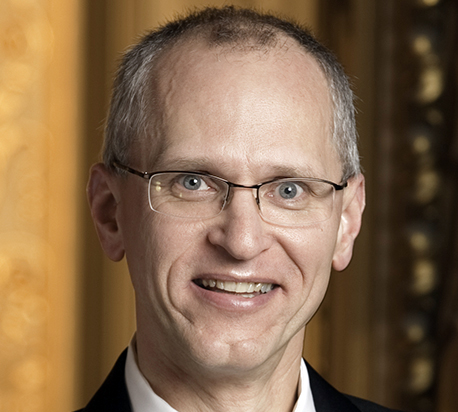Douglas Yeo
// Professor of Trombone at Arizona State University > *Web-Only*DOUGLAS YEO is Professor of Trombone at Arizona State University, and retired Bass Trombonist of the Boston Symphony Orchestra, based in Phoenix, Arizona. He has been a frequent soloist with orchestras and brass bands around the world, has given master classes on five continents, and is featured on the original film soundtracks for “Saving Private Ryan”, “Schindler’s List”, and “Mystic River”. From 1998 to 2008, he was Music Director of the New England Brass Band with which he released five recordings. Douglas Yeo is a graduate of Wheaton College (Illinois) and New York University.
Websites: www.yeodoug.com and www.asutrombonestudio.org
Photo: Michael J. Lutch
Interview:
I don’t think music in and of itself has the kind of power to transform our capacity to love and forgive. Music is inanimate, truth-dumb, and incapable of doing anything. It has no intrinsic power to change anything. If we think it does, we have stepped across into idolatry, giving the created thing the power that properly belongs to its creator. It requires an agent – usually a person – to make music to be heard. Once music moves from printed page or mind concept to an aural entity, it then can take on associative meanings that activate our emotions. For good or for bad. The same can be said for paintings, or photographs – in and of themselves they have no power to change us. Yet, our REACTION to them can be very powerful.
Not everyone will have the same kind of reaction to a work of art. One person may feel powerfully moved; another may turn up their nose in disgust. Yet, I think it is true that there is some artifact of art that resonates with each person on Earth and, depending on the emotions it stirs – because God, at His heart, is a creating, creative being and in creating mankind in His image, we are endowed with a measure of that re-creative ability – can be a stimulating factor in positively interacting with others with deeds of love and forgiveness.
For each person, the positive value of the arts is determined by the expression of art that resonates with them. All art resonates differently with each person. Certainly art can positively communicate values of beauty, care, peace, and harmony. Likewise it can communicate hurt, dissonance, ugliness, and violence. The value is in the eye or ear of the beholder. I often think of Paul Hindemith’s poem, “The Posthorn”, where he wrote:
“Your task it is, amid confusion, rush and noise,
To find the lasting, calm and meaningful, and
Finding it anew, to hold and treasure it.”
That’s what I like to do with art.
My values have been set in place by God; my art is an expression of those values. Therefore, my values transform my art – my art doesn’t transform my values. I have been fortunate to creatively express my values for many years and each day it feels like I am doing it anew, like a sunrise, always changing, always provoking, always inspiring to do more and better with the gifts that God has given me.
“My values have been set in place by God; my art is an expression of those values.”
– Douglas Yeo, Professor of Trombone at Arizona State University


